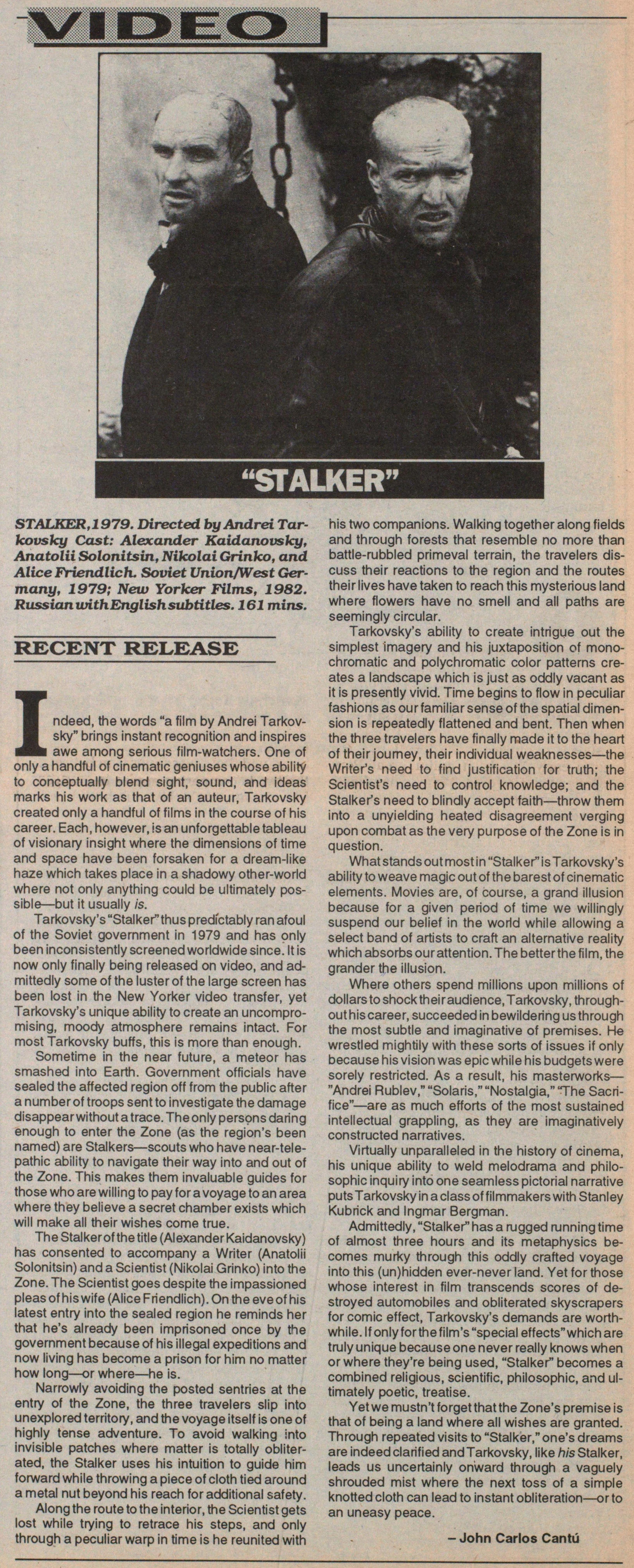Video

STALKER,1979. Directed by Andrei Tarkovsky Cast: Alexander Kaidanovsky, Anatolii Solonitsin, Nikolai Grinko, and Alice Friendlich. Soviet Union/West Germany, 1979; New Yorker Films, 1982. Russian with English subtitles. 161 mins.
Recent Release
Indeed, the words "a film by Andrei Tarkovsky" brings instant recognition and inspires awe among serious film-watchers. One of only a handful of cinematic geniuses whose ability to conceptually blend sight, sound, and ideas marks his work as that of an auteur, Tarkovsky created only a handful of films in the course of his career. Each, however, is an unforgettable tableau of visionary insight where the dimensions of time and space have been forsaken for a dream-like haze which takes place in a shadowy other-world where not only anything could be ultimately possible - but it usually is.
Tarkovsky's "Stalker" thus predictably ran afoul of the Soviet government in 1979 and has only been inconsistently screened worldwide since. It is now only finally being released on video, and admittedly some of the luster of the large screen has been lost in the New Yorker video transfer, yet Tarkovsky's unique ability to create an uncompromising, moody atmosphere remains intact. For most Tarkovsky buffs, this is more than enough.
Sometime in the near future, a meteor has smashed into Earth. Government officials have sealed the affected region off from the public after a number of troops sent to investigate the damage disappear without a trace. The only persons daring enough to enter the Zone (as the region's been named) are Stalkers - scouts who have near-telepathic ability to navigate their way into and out of the Zone. This makes them invaluable guides for those who are willing to pay for a voyage to an area where they believe a secret chamber exists which will make all their wishes come true.
The Stalker of the title(Alexander Kaidanovsky) has consented to accompany a Writer (Anatolii Solonitsin) and a Scientist (Nikolai Grinko) into the Zone. The Scientist goes despite the impassioned pleas of his wife (Alice Friendlich). On the eve of his latest entry into the sealed region he reminds her that he's already been imprisoned once by the government because of his illegal expeditions and now living has become a prison for him no matter how long - or where - he is.
Narrowly avoiding the posted sentries at the entry of the Zone, the three travelers slip into unexplored territory , and the voyage itself is one of highly tense adventure. To avoid walking into invisible patches where matter is totally obliterated, the Stalker uses his intuition to guide him forward while throwing a piece of cloth tied around a metal nut beyond his reach for additional safety.
Along the route to the interior, the Scientist gets lost while trying to retrace his steps, and only through a peculiar warp in time is he reunited with his two companions. Walking together along fields and through forests that resemble no more than battle-rubbled primeval terrain, the travelers discuss their reactions to the region and the routes their lives have taken to reach this mysterious land where flowers have no smell and all paths are seemingly circular.
Tarkovsky's ability to create intrigue out the simplest imagery and his juxtaposition of monochromatic and polychromatic color patterns creates a landscape which is just as oddly vacant as it is presently vivid. Time begins to flow in peculiar fashions as our familiar sense of the spatial dimension is repeatedly flattened and bent. Then when the three travelers have finally made it to the heart of their journey, their individual weaknesses - the Writer's need to find justification for truth; the Scientist's need to control knowledge; and the Stalker's need to blindly accept faith - throw them into a unyielding heated disagreement verging upon combat as the very purpose of the Zone is in question.
What stands out most in "Stalker" is Tarkovsky's ability to weave magic out of the barest of cinematic elements. Movies are, of course, a grand illusion because for a given period of time we willingly suspend our belief in the world while allowing a select band of artists to craft an alternative reality which absorbs our attention. The better the film, the grander the illusion.
Where others spend millions upon millions of dollars to shock their audience, Tarkovsky, throughout his career, succeeded in bewildering us through the most subtle and imaginative of premises. He wrestled mightily with these sorts of issues if only because his vision was epic while his budgets were sorely restricted. As a result, his masterworks- "Andrei Rublev," "Solaris," "Nostalgia," "The Sacrifice"- are as much efforts of the most sustained intellectual grappling, as they are imaginatively constructed narratives.
Virtually unparalleled in the history of cinema, his unique ability to weld melodrama and philosophic inquiry into one seamless pictorial narrative puts Tarkovsky in a class of filmmakers with Stanley Kubrick and Ingmar Bergman.
Admittedly, "Stalker" has a rugged running time of almost three hours and its metaphysics becomes murky through this oddly crafted voyage into this (un)hidden ever-never land. Yet for those whose interest in film transcends scores of destroyed automobiles and obliterated skyscrapers for comic effect, Tarkovsky's demands are worthwhile. If only for the film's "special effects" which are truly unique because one never really knows when or where they're being used, "Stalker becomes a combined religious, scientific, philosophic, and ultimately poetic, treatise.
Yet we mustn't forget that the Zone's premise is that of being a land where all wishes are granted. Through repeated visits to "Stalker," one's dreams are indeed clarified and Tarkovsky, like his Stalker, leads us uncertainly onward through a vaguely shrouded mist where the next toss of a simple knotted cloth can lead to instant obliteration - or to an uneasy peace.
~John Carlos Cantu